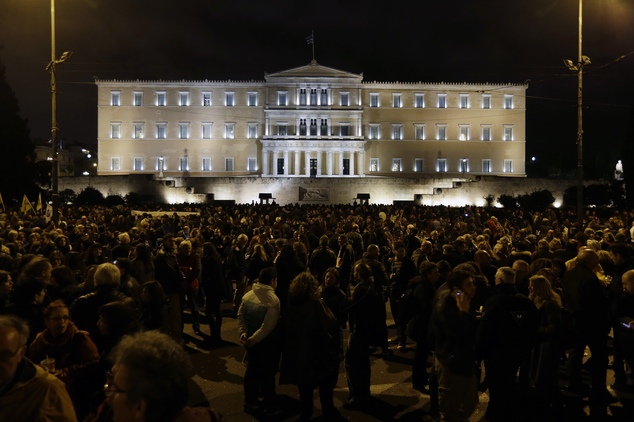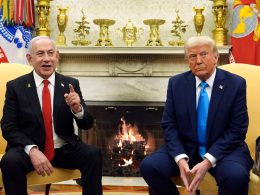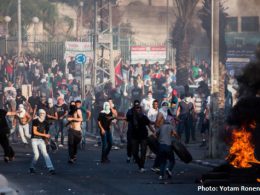Interview with Andreas Payiatsos, Xekinima (sister organisation of the Socialist Party in Greece), by Lucy Redler,
After 43 Syriza MPs (out of 149) refused to back the third memorandum package in mid-August, Tsipras resigned as Prime Minister. His plan was to strengthen his support with fresh elections, due to the fact that many Greeks still support the government, because the latest cuts included in the memorandum will not be felt until the autumn. Directly after this announcement, 25 MPs, most of them from the “Left Platform” of the party, broke away from Syriza and formed “Popular Unity” (Laiki Enotita). This new force is supported by Xekinima. Here we publish an interview with Andreas Payiatsos, general secretary of Xekinima.
What does “Popular Unity” stand for?
“Popular Unity” is a reflection of the current state of the rapidly changing class consciousness in Greece.
In the past three or four years, there was a massive increase in support for Syriza from 3-4% to 36% in the elections in January 2015. After the sell-out by the Syriza leadership on July 12, a split occurred in the party. In particular, many rank and file members turned their backs on the party. “Popular Unity” is a new formation which has been created to the left of Syriza.
Its central message is the rejection of the sell-out of Syriza’s electoral programme and of the principles of the Left, in the name of staying in the eurozone. Its position towards the eurozone is a central issue for “Popular Unity”. This position is quite clear: we need a programme defending the interests of working people. If these leads to us having to leave the euro, then we have to do that without hesitation. Thus, “Popular Unity” stands for a break with the eurozone. However, it is not a nationalist formation, rallying around a programme of a “return to the Drachma”.
The programme, which is currently being discussed by “Popular Unity”, is an anti-capitalist programme. It calls for a cancellation of the debt, the nationalisation of the banking system and the taking into public ownership of key industries. It also raises the demand for workers’ control and management in the economy and in society and takes up the idea of a planned economy, in order to develop the economy with a particular emphasis on agriculture, raw materials and the manufacturing industry. Instead of orientating the economy mainly towards services and tourism, as in the past, “Popular Unity” wants to concentrate more on the production of real products.
Which organisations were among the founders?
“Popular Unity” was originally founded by the forces around the “Left Platform” (in Syriza); four other forces from the “Initiative of the 1000” including Xekinima; two breakaway groups originating in the KKE; the ”Socialist Left – Dikki“ and three groups from Antarysa, although the latter do not currently represent a majority within Antarsya.
According to the current state of discussions it is clear that the programme will be much more progressive and much clearer than the previous programmes of Syriza. It is not ambiguous or open to different interpretations, like the Syriza programmes of the past when in an attempt to compromise with the right and the left wings, the result was something that could satisfy all “tastes”.
It is also clear that the demands of the programme cannot be fulfilled within the Eurozone. The return to a national currency is not an end in itself, but is seen as a necessary means to get the economy out of crisis, put it on the path of growth and orientate it towards the interests of the working class.
How big is the potential for “Popular Unity” in the elections in September?
Opinion polls suggest that it is an important force and that can reach 7-8%. There is no guarantee of this, but this is approximately its potential – maybe it could even get more. The support for “Popular Unity” mirrors the poll results for Syriza, which have declined by the same amount. However, it is also important that many people will not vote. It is likely that non-voters will be the largest “party”. The reason for this is that there has been a mass demoralisation.
Does “Popular Unity” damage the electoral prospects of “Golden Dawn”?
I think so. It is very important that “Popular Unity” has developed and is taking part in the elections. Had this not happened, “Golden Dawn” would certainly have profited from Syriza’s sell-out. We still expect “Golden Dawn” to increase its share of the vote in this election, but the increase will be much smaller than it would have been if “Popular Unity” had not been standing.
Will there be local branches of “Popular Unity”?
At the moment there are no local branches – “Popular Unity” is an alliance of different organisations without branches, individual membership and proper structures. This is partially due to the fact that it is a very new formation. Xekinima suggests the founding of local branches and an open call to workers and youth to join, on the basis of individual membership, so that as many people as possible can get involved. Needless to say, the building of a very democratic internal regime and structures is crucial for the future of “Popular Unity”.
Xekinima is participating in “Popular Unity”, but also in the “17th of July initiative”. Why?
Yes, that is true. The “17th of July initiative” came into existence last month, before the founding of “Popular Unity” and was developed as an appeal for the foundation of a new left force. On the basis of this appeal and a very radical programme, the “17th of July initiative” has attracted quite a number of different forces.
About one month later, “Popular Unity” was formed, but most of the forces involved in the “17th of July initiative” are not prepared to join. They have different political backgrounds, and are prepared to support “Popular Unity” in elections, but will not join it.
Currently, there are mass resignations from Syriza, but not all of these people are joining “Popular Unity”. The core of “Popular Unity” consists of the Left Platform, which has its origins in the Communist Party. The left in Greece is broader, and not everyone identifies with this current of the Greek left, which does not have a strong tradition of internal democracy or involvement in social movements.
There are two more factors why some of those leaving Syriza hesitate to join “Popular Unity”: Firstly, there is a massive demoralisation and a general loss of faith in left formations after Tsipras’ sell-out. Secondly, some of the leading members of “Popular Unity” were ministers in the Syriza government right up until “Popular Unity’s” creation and this causes doubts in the minds of some activists.
Xekinima participates in “Popular Unity” and makes suggestions as to how something which up until now has been an alliance of different organisations can be structured in a democratic way without being dominated by one group, and how free and democratic discussions and individual membership can be enabled in the future. These are important conditions for the success of “Popular Unity”. It must orientate itself towards the movements of the working class, in order to further struggles and to develop social struggles around its programme. We will maintain Xekinima as a revolutionary organisation and work towards developing a mass revolutionary force out of “Popular Unity”.
In Germany, representatives of DIE LINKE (Left Party) such als Gysi, Riexinger and Kipping have stood by Tsipras. What do you think is the task for parties like DIE LINKE internationally?
Supporting Tsipras in these circumstances is a terrible mistake. He has switched sides. The ruling class in Greece has suddenly fallen in love with Tsipras. The mass media, which are under the control of the ruling class (owners of shipping companies, bankers, major capitalists) stand behind Tsipras and attack “Popular Unity”.
New Democracy (ND), Pasok and To Potami say that they are open to the idea of a “National unity government” with Tsipras. Tsipras will most probably, despite the propaganda of the ruling class and the hope of the SYRIZA leadership, fail to get a majority government, so the possibility of joining with his enemies of yesterday in the same government is very real.
Tsipras is now introducing measures which ND would not have dared to introduce in the second part of 2014, such as the biggest privatisation programme in the history of the country. Already, the government of Tsipras has lowered the minimum pension from 490 to 360 euros a month. ND did not dare to do this. In addition, Tsipras signed up to the condition that every single law must be approved by the Troika. This means that Tsipras is tied to the third memorandum and has no freedom whatsoever to do anything that goes against the will of the Troika.
Finally, Tsipras has brushed aside in the most cynical and blunt manner, every trait of respect for democracy. Both in society, by ignoring the magnificent, historic “No” of July 5 and inside his own party, by signing the third memorandum and calling for speedy early elections without allowing the party to have any kind of say, even of the most limited character. Not even the Central Committee (CC) or the Political Secretariat of the party were ever allowed to express an opinion, whereas the decision of the CC to call an emergency congress sometime in September was thrown into the dustbin by Tsipras.
Some echo the arguments of the group around Tsipras and use the figures of the primary budget surplus to justify the memorandum. This is also a deception, because the primary surpluses for the next two years will be lower, (as a result of the mess in which the economy is at present) but immediately afterwards they will rise to 3.5% – which is around the same figure ND agreed to in the 2012, second memorandum. These arguments want us to forget that the national debt after Tsipras’ “achievements” will rise by an additional 86 billion euros, (i.e. approximately by 47%) on the top of the already existing debt of 180% of GDP.
The Greek masses will continue to fight, despite all this. But they cannot conduct this struggle alone. They need the support of workers in Europe and internationally. The experiences in Greece, on the other hand, contain valuable lessons for the left internationally, particularly as regards the question of what kind of programme is required to lead the country out of the crisis. Only a socialist programme can save people in Greece, in Europe and the whole planet from the barbarism of the capitalist system.
Glossary:
Antarsya: “Anti-capitalist Left cooperation for the overthrow”, Alliance of the radical left outside of Syriza
Dikki: Socialist Left, a 1995 left breakaway from Pasok that is now taking part in “Popular Unity”
“Initiative of the 1000”: Initiative founded in November 2012 by 1,200 signatories in favour of advancing unity amongst the Greek left and a left government on the basis of a break with the capitalist system.
17th of July initiative: The 17th of July initiative met in Athens a few days after Tsipras’ agreement to the third memorandum, to launch an appeal for the building of a new left force. Xekinima is a part of this initiative. Around 250-300 people took part in the initial meeting.
KKE: Communist Party of Greece, Stalinist and strongly sectarian
ND: New Democracy, conservative bourgeois party who led the previous government before SYRIZA’s victory last January, in coalition with Pasok
Pasok: social democratic party of Greece, founded in 1974 and former its first government in 1981 after winning 48% of the vote. Despite its “left” programme it worked within the capitalism and now is a bourgeois party which has massively lost support, getting under 5% in the January 2015 election. Pasok has been in government with ND and supported austerity policies.
To Potami: “The River”, liberal bourgeois party, founded in 2014.












